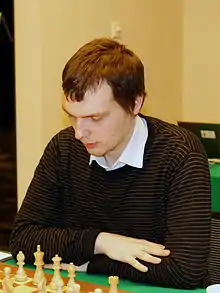Kacper Piorun
Kacper Piorun (born 24 November 1991) is a Polish chess grandmaster, a five-time world champion in chess problem solving, and two-times winner of the Polish chess championship.
| Kacper Piorun | |
|---|---|
 Kacper Piorun in 2014 (Warsaw) | |
| Country | Poland |
| Born | 24 November 1991 Łowicz, Poland |
| Title | Grandmaster (2012) International Solving Grandmaster (2011) |
| FIDE rating | 2615 (February 2021) |
| Peak rating | 2685 (July 2016) |
Career
In 2007 Kacper Piorun won the Polish under-16 chess championship in Łeba. In 2009 he finished third in the World Youth Chess Championship. In 2010 he won the Rubinstein Memorial in Polanica-Zdrój. In 2013 he won the Polish Blitz Chess Championship in Bydgoszcz. In 2015 Piorun took clear first place at the 17th Open of Sants, Hostafrancs & La Bordeta in Barcelona[1] and at the 19th Open International Bavarian Chess Championship in Bad Wiessee.[2] He has also competed successfully in several Polish Team Chess Championships.[3] He won the Polish chess championship in 2017 and in 2020.[4][5]
Piorun played for Poland in the European U18 Team Chess Championship in 2008, winning two gold medals (team and individual on board 3), and 2009, winning the team silver. He took part in the 2013 European Team Chess Championship in Warsaw, playing on board 4 for Poland's second team.[6]
Piorun is an excellent chess problems solver. In 2011 he won the individual World Chess Solving Championship in Jesi and became an International Solving Grandmaster as a result.[7][8] Piorun won the world individual title also in 2014 in Berne,[9] 2015 in Ostróda,[10] and 2016 in Belgrade.[11] He won team gold with Poland at the World Chess Solving Championship in Jesi 2011,[8] Kobe 2012,[12] Batumi 2013,[13] Berne 2014,[9] Ostróda 2015,[10] Belgrade 2016 and Dresden 2017 events.
During the 2018 Chess Olympiad in Batumi, he defeated the thirteenth best player in the world, Hikaru Nakamura,[14] and claimed fourth place overall with the Polish team.
He tied 3rd to 11th place in the 2019 European Individual Championship with David Anton Guijarro, Ferenc Berkes, Niclas Huschenbeth, Sergei Movsesian, Liviu-Dieter Nisipeanu, Grigoriy Oparin, Maxim Rodshtein, and Eltaj Safarli.[15]
References
- "GM Piorun tops 17th Open of Sants, Hostafrancs & La Bordeta". Chessdom. 2015-09-01. Retrieved 24 December 2015.
- "GM Kacper Piorun wins 19th Bad Wiessee International Tournament 2015". Chessdom. 2015-11-09. Retrieved 10 November 2015.
- OlimpBase :: Polish Team Chess Championship :: Kacper Piorun
- Lotto Indywidualne Mistrzostwa Polski
- "The Week in Chess 1343". theweekinchess.com. Retrieved 2020-08-09.
- Kacper Piorun team chess record at Olimpbase.org
- 54th Meeting of the World Federation for Chess Composition in Jesi, Italy August 20 - 27, 2011
- Nunn, John (2011-09-14). "Poles take World Problem Solving Championship 2011". ChessBase. Retrieved 24 December 2015.
- "38th World Chess Solving Championship". Retrieved 10 November 2015.
- Nunn, John (2015-08-20). "Ostroda: 39th World Solving Championship (2)". ChessBase. Retrieved 22 December 2015.
- Nunn, John (2016-08-17). "Poles dominate World Problem Solving Championship". ChessBase. Retrieved 2016-09-01.
- 36th World Chess Solving Championship Kobe 17.-18.9.2012
- 37th World Chess Solving Championship
- "43rd Olympiad Batumi 2018 Open". Retrieved 2018-10-06.
- "2019 European Individual Championship chess tournament results - ChessFocus.com". www.chessfocus.com. Retrieved 2020-08-16.
External links
- Kacper Piorun rating card at FIDE

- Kacper Piorun chess games at 365Chess.com
- Kacper Piorun player profile and games at Chessgames.com